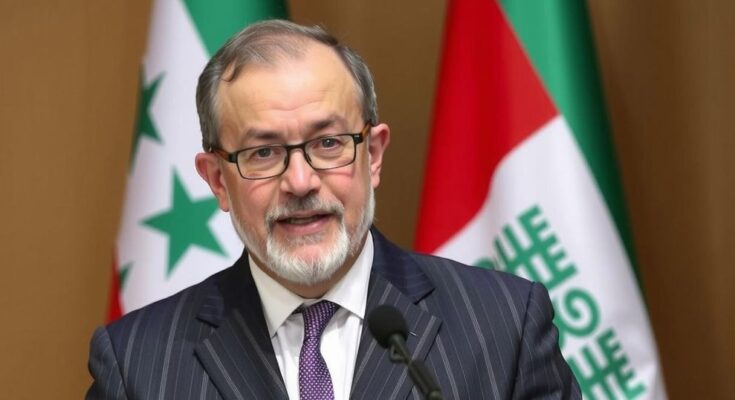Syria’s new leader, Ahmed al-Sharaa, has pledged not to negatively interfere in Lebanon, emphasizing respect for the country’s sovereignty. Following his ascent to power amid a significant offensive, Sharaa has engaged with regional powers such as Turkey and Saudi Arabia to reshape Syria’s foreign relations. His statements reflect a strategic shift aimed at stabilizing both domestic and regional dynamics, particularly in light of the historical complexities of Syrian-Lebanese relations.
In a pivotal meeting this past Sunday, Syria’s new leader, Ahmed al-Sharaa, proclaimed a commitment to refraining from harmful interference in Lebanon. This statement comes shortly after his ascension to power amid a major offensive that resulted in the fall of long-standing ruler Bashar al-Assad. Al-Sharaa’s assurance to respect Lebanon’s sovereignty and autonomy signals a potential shift in Syria’s diplomatic relations, particularly as he engages with various regional powers, including Turkey and Saudi Arabia.
Al-Sharaa’s discussions included meeting with Turkish officials, such as Foreign Minister Hakan Fidan, following support from Ankara for his Islamist faction, Hayat Tahrir al-Sham (HTS). Regional dynamics are shifting, with Saudi Arabia, which had previously opposed Assad, also reestablishing ties with the Syrian government, highlighting a broader movement toward engagement. Notably, Sharaa stated, “Syria will no longer exert negative interference in Lebanon at all,” emphasizing a new diplomatic approach that respects Lebanon’s territorial integrity.
Furthermore, as Syria navigates its post-conflict environment, the interactions with influential figures such as Lebanese Druze leader Walid Jumblatt, indicate a recognition of past grievances and an effort to foster reconciliation. While concerns linger regarding the rise of Sunni Islamist governance by HTS, the group has attempted to temper its previous rhetoric, suggesting a potential for moderated policies. Despite international apprehensions, global powers have engaged with Syria’s new administration, demanding protections for vulnerable groups, while simultaneously addressing the threats posed by extremism.
Ayatollah Ali Khamenei of Iran, a critical ally of the former Assad regime, remarked on the resilience and strength of Syria’s youth in combating instability. He underscored the role of young Syrians as they strive to secure their nation against external threats that have historically plagued the region. With renewed geopolitical alignments and an evolving narrative, Syria’s future remains a focal point of regional and international diplomacy.
The political context surrounding Syria has been marked by a prolonged civil war that began in 2011. The fall of Bashar al-Assad’s regime represents a significant turning point, and the emergence of Ahmed al-Sharaa as the new leader brings with it questions regarding internal stability and foreign relations. Historically, Syria has exerted considerable influence over Lebanon, often leading to friction and unrest in Lebanese politics. The recent pledges by al-Sharaa to respect Lebanese sovereignty aim to reassure both domestic and international observers of a move towards more constructive regional relations. The involvement of major powers such as Turkey and Saudi Arabia also indicates a shift in the geopolitical landscape of the Middle East, particularly as the region continues to grapple with the consequences of the Syrian civil war.
In conclusion, Ahmed al-Sharaa’s commitment to avoiding negative interference in Lebanon signifies a potential change in Syria’s foreign policy and regional engagement. His administration’s outreach to Turkey and Saudi Arabia may foster a new era of diplomatic relations. As the situation continues to evolve, the international community watches closely, anticipating how these changes will impact both Syria’s stability and its relationship with neighboring countries.
Original Source: www.hindustantimes.com




